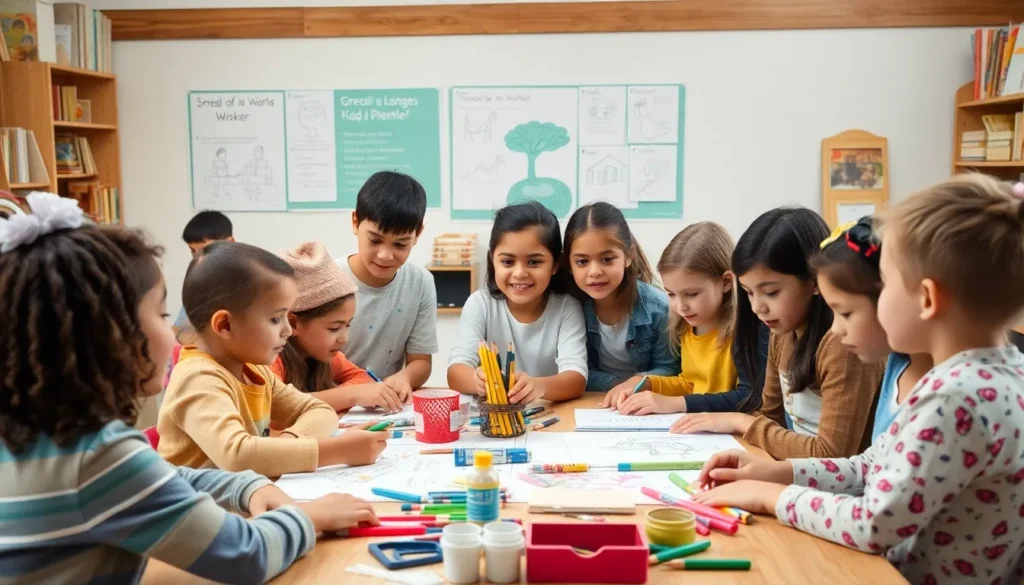Table of Contents
ToggleHomeschooling can feel like a wild roller coaster ride, complete with unexpected twists and turns. But what if there was a way to make that journey a little smoother? Enter homeschool workshops—your secret weapon for turning chaos into creativity. These workshops aren’t just about textbooks and tests; they’re a treasure trove of hands-on experiences, expert advice, and community connections that can transform the way kids learn.
Overview of Homeschool Workshops
Homeschool workshops provide valuable support for families navigating the unique challenges of homeschooling. These programs enrich the educational experience with collaborative activities and expert-led sessions.
Definition and Purpose
Homeschool workshops are organized sessions designed to enhance children’s learning outside traditional classroom settings. They provide a structured environment where children can engage in various educational activities. These workshops typically focus on specific subjects or skills, allowing participants to explore topics in greater depth. The primary purpose is to foster creativity, critical thinking, and social interaction among homeschool families. Educational leaders facilitate these sessions, ensuring quality content and guidance.
Benefits of Participation
Participating in homeschool workshops offers numerous advantages for both children and parents. Socialization opportunities arise as kids connect with peers sharing similar educational pathways. Skills development occurs through hands-on activities and expert-led discussions. Access to specialized knowledge is available, allowing families to explore diverse subjects not often covered at home. Convenience factors also play a role, as workshops are usually scheduled to accommodate homeschooling routines. Parental networks form during these workshops, providing support, resources, and shared experiences.
Types of Homeschool Workshops

Homeschool workshops come in various types, each targeting distinct aspects of children’s education. Families can choose the workshops that best meet their needs and preferences.
Academic Workshops
Academic workshops focus on essential subjects such as math, science, and language arts. These sessions provide in-depth exploration of curriculum concepts, helping students grasp complex topics. Experienced educators often lead these workshops, offering tailored instruction and assessments. Additionally, hands-on activities reinforce learning objectives, making subjects more engaging. Participants can benefit from one-on-one mentoring, enhancing their understanding and performance in formal assessments.
Creative Workshops
Creative workshops emphasize artistic expression and critical thinking. Activities may include art, music, drama, or writing, allowing students to explore diverse talents. These sessions encourage imaginative thinking and collaboration, fostering an appreciation for the arts. Often taught by professionals, these workshops provide valuable insights into various creative fields. By participating, children develop skills that enhance their overall educational experience and personal growth. Exploratory projects can build confidence and encourage lifelong creativity.
How to Find Homeschool Workshops
Locating homeschool workshops enhances educational experiences for families. Various avenues exist to discover suitable options.
Online Resources
Online platforms serve as excellent starting points. Websites like Meetup and Eventbrite list various local workshops tailored for homeschool families. Social media groups dedicated to homeschooling often share upcoming workshops. Parents can also find specialized educational websites offering resources and directories for workshops across the country. Virtual workshops allow participation from anywhere, making it easy to engage with experts in diverse subjects. Engaging with online communities enables sharing strategies and learning opportunities to maximize workshop attendance.
Community Centers
Community centers frequently host workshops designed for homeschool students. Local branches of organizations like the YMCA and libraries provide programs that cater to varying interests. Parents can find craft classes, science fairs, and language sessions specifically for homeschooled children. Additionally, partnering with local educators helps in developing workshops that meet curriculum standards and local needs. Attending community events lets families interact with other homeschoolers while seeking valuable resources and support. Emphasizing collaboration with community organizations strengthens connections and expands educational opportunities.
Planning and Organizing Workshops
Organizing effective homeschool workshops involves careful planning and execution. Clear objectives enhance the educational value and participant engagement.
Setting Goals and Objectives
Establishing specific goals helps guide the structure of each workshop. Identify desired outcomes, such as skill acquisition or thematic understanding. Use measurable objectives to assess the workshop’s effectiveness. For instance, a math workshop might aim for students to solve complex problems independently by the end of the session. Consider input from families to align goals with their needs, ensuring relevance. Prioritize topics that stimulate interest, as this can drive active participation.
Engaging Participants
Activating participant interest creates a vibrant workshop atmosphere. Apply interactive techniques like hands-on activities, discussions, and group projects. Provide opportunities for students to share their knowledge, fostering a sense of ownership in their learning. Use diverse resources, such as guest speakers or multimedia tools, to keep sessions dynamic. Continuously seek feedback from participants to improve future workshops, making them more responsive to families’ preferences. This two-way communication enriches the overall experience, creating strong connections within the homeschool community.
Homeschool workshops play a vital role in enriching the educational experiences of children and supporting families. By providing hands-on learning opportunities and fostering community connections, these workshops address the unique challenges of homeschooling. They encourage creativity and critical thinking while offering specialized guidance from experienced educators.
As families explore various options for workshops, they’ll find a wealth of resources available online and within their communities. Engaging in these collaborative sessions not only enhances academic and creative skills but also builds lasting relationships among homeschool families. Embracing the benefits of homeschool workshops can transform the homeschooling journey into a more rewarding and fulfilling adventure.







